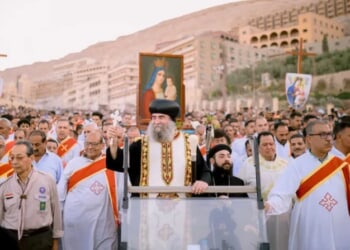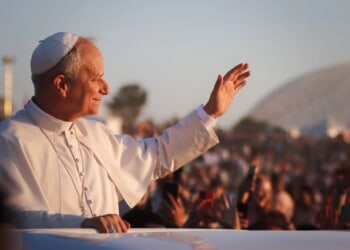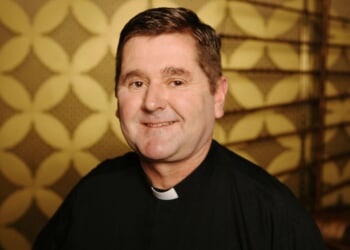ACI Africa, Sep 8, 2025 /
12:07 pm
To realize synodality in Africa, the Church on the continent should prioritize counseling amid the myriad of scars — including those of colonialism, war, ethnic conflict, poverty, disease, and systemic injustices — a Catholic religious sister said at the second African Women Theologians Conference in Nairobi, Kenya, on Sept. 3.
In her presentation on the first day of the conference, Sister Gisela Rfanyu Shey, whose talk was titled “Counseling as a Path to Healing in a Synodal Church: An African Perspective,” said the scars cannot be healed by the sacramental ministry alone.
“The Catholic Church in Africa stands at a crossroad, challenged by the deep wounds of its people and the urgent need for reconciliation and healing,” Rfanyu, who is a therapist and counselor, said in her presentation at Hekima University College.
Even though the Church’s synodal journey offers “a timely opportunity for renewal and transformation,” the Catholic sister said that “for synodality to be truly effective in Africa, it must embrace counseling as an essential tool for healing.”
With scars that the African continent is experiencing, Rfanyu emphasized that “counseling emerges as a necessary pastoral tool for emotional and spiritual healing within a synodal framework that emphasizes listening and accompaniment.”
Counseling, she explained further, “offers a path for communities to engage in healing, theology, dialogue, reconciliation, and restoration — values deeply embedded in both African cultures and Christian spirituality.”
With its communal, participatory framework and the call to discern and journey together under the Holy Spirit’s guidance, Rfanyu said the synodal process aligns with counseling “as a positive, reflective tool.”
She said counseling helps individuals and communities navigate personal and relational challenges while promoting understanding, healing, and growth in faith and practice.
“Biblical counseling, a form fitting within the synodal process, emphasizes discipline, discipleship, scriptural authority, and spiritual growth conducted under Church authority to guide participants towards sanctification and deeper trust in God during their synodal journey,” she said.
For this reason, Rfanyu said that “counseling in the synodal process facilitates the internal and interpersonal work needed for genuine participation, discernment, and communal transformation.”
Counseling, she continued, “supports the creation of safe, respectful spaces where honest communication and spiritual guidance can thrive in the path of synodality. In counseling, we respect each other. We give room to each other.”
The Cameroonian member of the Holy Union Sisters of the Sacred Hearts also explained that “synodality is calling on us to consider each person. And before you consider each individual in a society, you have to have that listening ear to everyone who comes across you.”
“Counseling is for healing. You may not need any medication, but the listening, the paying of attention, and the respect for one another bring about healing,” she explained, drawing parallels between synodality and counseling.
In the African context, Rfanyu proposed a synodal model of counseling that synthesizes insights on healing and synodality and offers practical pathways for implementation.
Over the years, she said, synods have played crucial roles in resolving doctrinal conflicts, shaping liturgy, and fostering ecclesial unity, thus fostering healing.
“Synodality is more than a governance structure. It is a healing pathway for a Church wounded by clerical bias, clericalism, abuse, and fragmentation. It enables pastoral renewal by shifting focus towards inclusion, accountability, and mutual respect,” she said.
(Story continues below)
Subscribe to our daily newsletter
On the theological justification for healing, Rfanyu said: “Christian anthropology views the human being as a unified whole — body, mind, and soul.”
“Theologically, healing is a core ministry of Christ and the Church. Jesus’ public ministry involved restoring sight, speech, and dignity to the afflicted, modeling a holistic approach to salvation,” she said.
She added: “Counseling within the Church echoes this ministry by accompanying those who suffer and offering pathways to spiritual and emotional restoration.”
Rfanyu said the integration of counseling within the synodal journey of the Church in Africa should not be perceived as merely a pastoral option but as a theological and cultural imperative.
She emphasized that the wounds of Africa, which include psychological, spiritual, and communal suffering, “demand a holistic response that draws on the best of both tradition and innovation.”
“Synodality, rooted in the Church’s identity as the people of God, provides a framework for participation, discernment, and healing,” she said, adding that, on the other hand, counseling — grounded in both psychological theory and theological wisdom — offers practical tools for accompaniment, reconciliation, and restoration.
She said the dialogue between psychology and theology, enriched by African communal tradition, points the way forward.
“By training pastoral agents, empowering small Christian communities, collaborating with professionals, and adapting models to local cultures, the Church can become a truth-filled hospital, a place where wounds are named, stories are heard, and healing is possible,” she said.
In doing so, Rfanyu said, “the Church in Africa not only responds to the urgent needs of its people but also offers a model of synodal healing for the universal Church.”
This story was first published by ACI Africa, CNA’s news partner in Africa, and has been adapted by CNA.
















